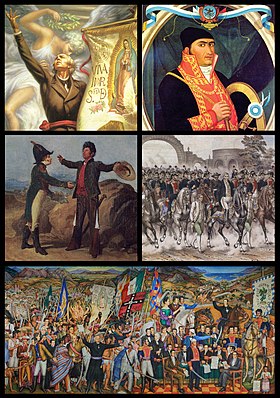War of Mexican Independence
| Mexican War of Independence | |||||||||
|---|---|---|---|---|---|---|---|---|---|
| Part of the Spanish American wars of independence | |||||||||
 Clockwise from top left: Miguel Hidalgo, José María Morelos, Embrace of Acatempan between Iturbide and Guerrero, Trigarante Army in Mexico City, Mural of independence by O'Gorman |
|||||||||
|
|||||||||
| Belligerents | |||||||||
|
|
|||||||||
| Commanders and leaders | |||||||||
|
Miguel Hidalgo † (1810–11) Ignacio Allende † (1810–11) Ignacio López R. † (1810–11) José María Morelos † (1810–15) Vicente Guerrero (1810–21) Mariano Matamoros † (1811–14) Guadalupe Victoria (1812–21) Francisco Xavier Mina † (1817) Agustín de Iturbide (1821) |
Francisco Venegas (1810–13) Félix María Calleja (1813–16) Juan Ruiz de A. (1816–21) Francisco Novella (1821) Juan O'Donojú (1821) |
||||||||
| Strength | |||||||||
|
100,000 irregular 23,100 regular |
17,000 | ||||||||
| Casualties and losses | |||||||||
| 2,000 killed | |||||||||
Mexican independence
100,000 irregular
The Mexican War of Independence (Spanish: Guerra de Independencia de México) was an armed conflict, and the culmination of a political and social process which ended the rule of Spain in 1821 in the territory of New Spain. The war had its antecedent in Napoleon's French invasion of Spain in 1808; it extended from the Grito de Dolores by Father Miguel Hidalgo y Costilla on September 16, 1810, to the entrance of the Army of the Three Guarantees led by Agustín de Iturbide to Mexico City on September 27, 1821. September 16 is celebrated as Mexican Independence Day.
The movement for independence was inspired by the Age of Enlightenment and the liberal revolutions of the last part of the 18th century. By that time the educated elite of New Spain had begun to reflect on the relations between Spain and its colonial kingdoms. Changes in the social and political structure occasioned by Bourbon Reforms and a deep economic crisis in New Spain caused discomfort among the Creole (native-born) elite.
Political events in Europe had a decisive effect on events in most of Spanish America. In 1808, King Charles IV and Ferdinand VII abdicated in favor of French leader Napoleon Bonaparte, who left the crown of Spain to his brother Joseph Bonaparte. The same year, the ayuntamiento (city council) of Mexico City, supported by viceroy José de Iturrigaray, claimed sovereignty in the absence of the legitimate king. That led to a coup against the viceroy; when it was suppressed, the leaders of the movement were jailed.
...
Wikipedia
